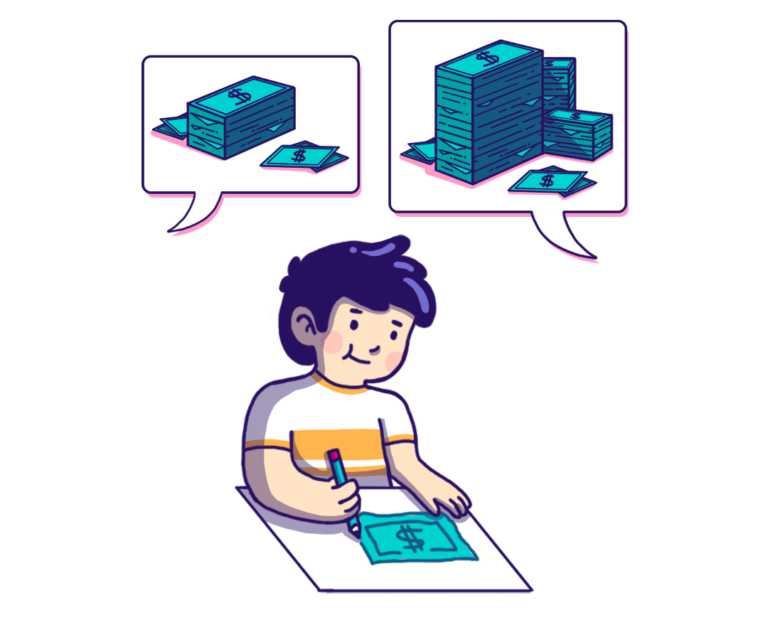Financial Planning | Life | Personal Finance | Relationships & Family | Article
How to Teach Children About Money
by Sophia | 9 Dec 2019 | 6 mins read

You probably have that one friend who just seems to have it together financially. You know, the fella who saved up a six-figure amount before 30.
How did they gets to far ahead? For one, they probably had a strong grasp of the most basic financial skills — saving and spending.
And if you think about it, the foundations of both are laid at home – when parents gave us our first allowances (only for them to be blown on snacks or toys, oops).
So, if it’s too late for us, how do we set our offspring up for future financial success?
Kids Observe More Than You Realise
Out of nowhere, a young kid spews the word shit in the middle of the playground.
Horror washes over you. Your mind starts racing and your adult sensibilities run wild. Already, you’re going through the list of possible bad influences who could have destroyed innocence.
Maybe it was a wayward teenager that passed them by once? Or maybe they heard it on TV? Eh dear, I think we should cancel HBO…
More often than not, this newfound ability to swear may have come from that child’s caregiver or parent (even if it may not always be the case). And it’s not just the occasional swear word – children pick up a huge chunk of stuff just by observing their grownups.

This is Vygotsky’s theory of social learning.
According to Alex Kouzlin, translator of Vygotsy’s works and a distinguished Russian-American psychologist, social learning “stipulates that the development of the child’s higher mental processes depends on the presence of mediating agents in the child’s interaction with the environment.”
In English this time: learning emphasises the community that surrounds a child. This would mean a child’s parents, caregivers, and even other kids in school.
A child will derive meaning from his environment by doing something called modelling. This may be done unconsciously. But what does it really mean?
Let’s put this into a context where we’re trying to teach a child about financial management.
Put Your Money Where Your Mouth Is
Peter, aged 4, is playing in the living room while his parents are stressing over their aircon unit that just broke down. He hears daddy tell mummy, “Just buy a new one lah.”
TV malfunctioning? Buy a new one. Spilled water on your MacBook? Buy a new one!
In this scenario, Peter’s parents are modelling poor financial management. When Peter grows older, he may take a similar approach to his possessions — and his money.
Conversely, if Peter’s parents were more frugal and made an effort to scrimp and save wherever they could, it’s likely that he would grow up with better financial sensibilities.
In other words, the financial habits of his parents and caregivers matter a lot, and hold a lot of power in influencing and shaping his future habits!
You might be feeling the heat. Turns out, before you can even think about training your children, it might be you that needs some reformative action — to be a good role model for your child.
Meet Kids Where They Are
But I’m a person who reads finance websites like The Simple Sum, so I’m perfect with money. So, tell me, when do I start teaching my kid?
This is where Swiss psychologist Jean Piaget can weigh in with his theory on cognitive learning.
Essentially, he breaks down the cognitive abilities of children to different age groups.
Ages 2 to 7: Pre-operational Stage
- Children begin to think symbolically; they understand words can represent objects
- The child will be able to perform a physical task, but not mental ones
Ages 7 to 11: Concrete Operational Stage
- Children begin to thinking logically
- But their thoughts are still very concrete — and based off observation
Age 12 onwards: Formal Operational Stage
- Begins to be able to think abstractly and be able to tackle hypothetical problems
What this means is that parents have to tweak their approach when imparting financial habits, and simplify information according to the age of their kids.
Ages 2 to 7 should be focused on the physical aspects of money:
- Identifying and counting money
- The observation and practice of physical transactions such as earning, saving and spending
Ages 7 to 11 should focus on applying logic:
- Making purchase decisions
- Identifying and setting long or short-term saving goals for their wishlists (*cough* toys *cough*)
Ages 12 onward will understand abstract topics:
- Credit, debit, budgeting, etc.
But realistically, the first milestone is around the age of 4 to 5, where they are beginning to learn how to count — and past the age (below 4) where children are susceptible to the choking hazard that coins can pose. So this is is a good time for parents to introduce identifying and counting currency.
This is also the age where children can perform more chores, so a parent can implement paid-chores that can neatly introduce the concept of transactions.

Local financial blogger Brian (behind the blog Forever Financial Freedom) uses this method to encourage healthy money habits in his two sons, aged three and five.
“If they want something, they would need to save over time before they can actually get it,” he said. “And if they complete certain chores, I’ll “pay” them a dollar each time to be put into their piggy bank.”
He went on, “I only started this method earlier this year. My elder son is now more acquainted with money and counting.”
For savings? A parent can introduce the concept of a transparent jar — rather than a piggy bank — to help your kids see how their money is growing when they save.
An even more novel idea is where a parent can dollar-match the savings their child leaves within the jar. The longer the money is untouched, the more the savings grow — a physical representation of the concept of interest (and encourages the concept of delayed gratification!).
In Summary…
So Vygotsky and Piaget have given us some solid directives, for those who want to financially train your kids as early as possible. Here’s what we covered:
- Social learning means that kids will observe the behaviour and habits of their caregivers and parents, and similarly mirror them later on in life.
- Cognitive learning Parents should tweak their teaching methods to suit their young children (ie. simplify concepts according to a child’s developmental stage).
So give your kid a head start, start small in incremental steps, and integrate financial habits and concepts into their daily life. You may not see results immediately, but it’s at least a good start.














